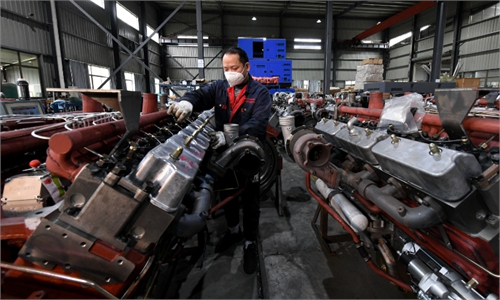
Illustration: Tang Tengfei/Global Times
China is currently optimizing COVID-19 responses and making a transition to the managed exit from mass nucleic acid testing - a decisive step toward bringing normal work and life back. The timing for the policy change is well calculated and deemed opportune now.The whole world is closely watching how the switch will play out. The country's giant economy is expected to quickly emerge from the adverse impacts of the epidemic early next year, and regain its steady growth momentum seen before 2020.
Since the state broadcaster CCTV announced a statement by the State Council on December 7, unveiling the 10 new guidelines that optimize epidemic prevention measures, most notably allowing home quarantine for infected cases and close contacts and largely scrapping the health QR code for entering office buildings and public places, the optimization will significantly stimulate the recovery of China's domestic consumption
Now, the broader services sector - including having a drink at a pub, dining-out with friends at restaurant, going to theater to watch a movie, and taking a flight or a high-speed train to travel and sightsee - will be reactivated. With the revival of services, more people's income will be increased, leading to recovery of other segments of the economy, such as imports and exports as well as housing consumption.
Many renowned international investment banks are upbeat about the prospects of China's economy in 2023. Goldman Sachs upgraded the economy's growth estimate to 5.2 percent, Morgan Stanley revised up its forecast to 5.4 percent, and Societe Generale upgraded its estimate to 5.3 percent. If not for the current monetary policy tightening by the US Federal Reserve and other central banks around the world, their estimates for Chinese growth next year could be even higher.
The extraordinary patience held by this country to wait out the COVID-19's generational mutations till it becomes milder and less fatal has paid off, as tens of thousands of precious lives have been saved in China. If China had chosen to "live with" the virus from the very beginning, like what the US did in 2020, many Chinese people may have perished, as China's population is four times of that of the US, which has reported its COVID death toll surpassing 1.1 million now.
There is a prerequisite for China's change of anti-virus policy that is the current Omicron variant is much weaker than previous strains seen in 2020 and 2021 such as Alfa and Delta which are more deadly. Though a small proportion of elderly Chinese people could still become seriously ill, the majority of Chinese people now have confidence that they are able to weather a surging wave of infections.
Just weeks ago, catching COVID-19 meant being taken to quarantine and the infected patient's entire residential building being locked down. Now, with the optimization of epidemic response measures, the country is presumably to recoup business operational normalcy in February or March.
Chinese policymakers have signaled all-out efforts during
the just-concluded Central Economic Work Conference to ensure an overall improvement in economic operations in 2023. It is expected a new set of pro-growth fiscal and monetary policies are to be issued in the near future. Basic infrastructure projects, real estate, rejuvenation of domestic consumption, social welfare and foreign trade will all get ramped-up investment.
However, some foreign media outlets are distorting facts and spewing fallacies about China's anti-COVID policy change. Some allege that China is likely to "export inflation" to other economies in 2023, while others accuse China's policy change "is subjecting its people to widespread disruptions and health risks."
As a matter of fact, Beijing residents have been pouring out onto the streets again over the weekend with downtown bars, cinemas and restaurants being packed with patrons. Chinese people are highly likely to enjoy a pleasant family reunion during the upcoming Spring Festival in late January.
And, as China still has droves of inexpensive labor force, the optimization of epidemic response measures will release the country's potential as the world's quality and inexpensive production hub, which means it won't export inflation at all.
The author is an editor with the Global Times. bizopinion@globaltimes.com.cn



